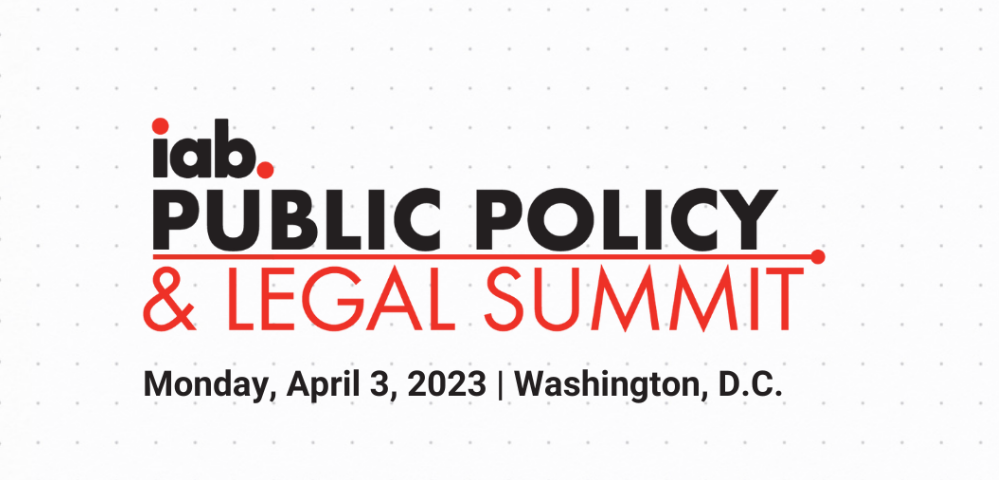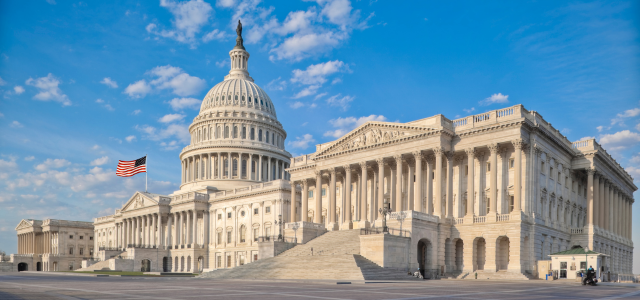
“Commercial Surveillance” Rules Threaten Internet Economy

Digital advertising powers the U.S. economy, connecting businesses and consumers, expanding web users’ choice of products and services, and creating opportunities for small businesses and creators on a multitude of e-commerce and media platforms. To some legislators and regulators, however, this essential technology is “commercial surveillance,” a trendy new term with potentially devastating consequences.
This year, the U.S. House of Representatives failed to advance the Banning Surveillance Advertising Act, which could have potentially banned first-party data for advertising purposes. A federal privacy bill featuring some of the same ideas has also stalled in Congress. IAB initially supported the American Data Privacy and Protection Act (ADPPA) to simplify a confusing patchwork of state laws, but the latest version would adversely impact our industry by limiting the use of third-party data and impose more complex regulations and heavier fines than many states.
The Federal Trade Commission (FTC) is forging ahead with an Advance Notice of Proposed Rulemaking (ANPR) for Commercial Surveillance and Data Security that goes much further. IAB recently filed a public comment as part of the rulemaking process. Not only is the FTC assuming legislative authority, as Congress continues to debate the issues, but the agency’s unclear objectives and instructions could lead to regulations as chaotic as the process has been. In a series of loaded questions, the FTC suggests the internet itself is an “unfair” and “deceptive” practice, ignoring the obvious benefits.
IAB sets the record straight. Rather than harm competition, digital advertising fosters it. Consumers prefer personalized ads, not irrelevant ones. The FTC’s efforts to protect consumers and increase competition would eliminate convenient, low-cost products Americans enjoy and make “Big Tech” bigger. Privacy for America has a better solution. The ad industry initiative supports federal legislation that would clearly define prohibited data practices, while preserving the benefits that come with responsible data use. The FTC is veering far off course.
Related Coverage:
Why the FTC’s Consumer Data Collection Crackdown put the Entire Economy at Risk (Ad Age)
IAB Rallies Against FTC Regulations That Could “Criminalize the Internet Itself” (The Drum)
Protecting Kids Online

FTC efforts to ban advertising predate the internet. In the 1970’s, when the agency tried to ban T.V. advertising for kids, Congress allowed its funding to expire. The FTC was asserting too much power over too wide a swath of the economy. Flash forward to today, and children’s advertising is back in the news. This time, digital advertising is the issue, and the FTC is exploring new guidance to protect kids online. IAB recently appeared at a virtual FTC event to help regulators avoid past problems and keep kids safe.
Our EVP of Public Policy, Lartease Tiffith, joined an expert panel to explain how digital advertising supports online services kids use to connect, learn and communicate. Without digital advertising, quality content could disappear behind paywalls and subscriptions. Families unable to afford the expense could lose access. If the FTC were to apply rules for kids to a wider range of media, audiences of all ages could lose access, but it’s a risk the FTC appears willing to take under a flexible interpretation of the Children’s Online Privacy Protection Act (COPPA) limiting its activities to children under 13.
With the President calling for increased protections for young people, IAB is urging our members to clearly distinguish entertainment from advertising and follow other guidance from IAB, the Better Business Bureau and FTC. IAB is also urging the FTC to distinguish between kids and older audiences capable of making their own decisions.
Related Coverage:
FTC to Digital Media Advertisers: It’s Time to Protect Kids (LexBlog)
Protecting Kids from Stealth Advertising (FTC Video on Demand)
U.S. Needs National Data Privacy Law

The U.S. needs a national privacy law to overcome conflicting, unclear state laws. Congress came as close as ever this summer, when the House Energy & Commerce Committee advanced the American Data Privacy and Protection Act (ADPPA), but progress stopped there. IAB initially supported the bill but could not support the final version, featuring some of the worst ideas of the Banning Surveillance Advertising Act and other poorly drafted legislation unfairly targeting digital advertising.
Partly modeled on the General Data Protection Regulation (GDPR), an EU law that has slowed innovation and growth in Europe, the latest ADPPA describes ordinary public data as “sensitive data”’ subject to penalties and fines. Restrictions on first-party data would impede businesses from communicating with their customers. Small businesses would suffer the most if the ADPPA were enacted, because they do not have access to the same level of first-party data and rely on third-party data to compete with more established companies. A coalition of advertising organizations including IAB underscored the dangers to House Energy & Commerce Committee leaders.
“There is simply no justification for subjecting data that is used solely for the purpose of delivering relevant advertisements to groups of consumers to such a burdensome standard,” we wrote. IAB will continue to press lawmakers for a solution to data privacy that also recognizes the importance of digital advertising to our country’s prosperity. Our Public Policy Team recently visited Capitol Hill to help sponsors of federal privacy legislation understand the stakes and a better way forward.
Related Coverage:
A National Data Privacy Bill is Gaining Traction, But Not Everyone Is on Board (Digiday)
Internet For Growth Rallies for Digital Advertising

Internet for Growth (I4G) is a nationwide coalition of small businesses and creators using digital advertising to pursue their dreams. Health care professionals, educators, restaurateurs, retailers, media publishers and more recently filed a public comment with the FTC opposing potential rules for “commercial surveillance” that would have unintended consequences for the entire economy.
“We share your view that privacy and security are vitally important in this digital age. But we strongly disagree with the Commission’s blanket approach attacking the whole of the data-driven digital advertising ecosystem – which has delivered enormous economic benefits to consumers and businesses – instead of narrowly and carefully addressing specific abuses by bad actors,” wrote I4G members to FTC commissioners.
People like marketing pro Drew Ament in Arizona and snack maker Andrew Whisler in Virginia are spreading the word in their local media and to federal elected representatives. Internet for Growth has sent nearly 20,000 letters supporting digital advertising to Members of Congress, often meeting in person to share their personal perspectives.
According to IAB’s “Economic Impact of the Market-Making Internet,” small businesses and the self-employed represent the greatest share of internet jobs. Thanks to digital advertising, web publishers, podcasters and video streamers are a booming employment category that barely existed a few years ago. Nearly half of all advertising and media jobs are digital-dependent. It’s incumbent on all of us to help lawmakers understand the importance of our industry. Internet for Growth, representing the voice of small business, is a crucial partner. To learn how your company can support Internet for Growth, contact Brendan Thomas at [email protected].
Related Coverage:
FTC Risks Killing Digital Advertising, the Economy’s Golden Egg (DC Journal)
Washington Eyes Influencer Marketing

When the Securities Exchange Commission (SEC) fined celebrity Kim Kardashian for failing to properly disclose payment for a crypto endorsement on social media, influencer marketing exploded into the headlines. In September, IAB had submitted its comments to the FTC underscoring not only the growing importance of endorsements in a changed media environment, but also the need to improve federal guidance. The FTC should clarify its proposed “unavoidable” disclosure standard, which could deter internet users from content they enjoy, and look to platform-provided transparency tools for more user-friendly solutions.
According to IAB research, the digital-advertising enabled creator economy is dynamic and growing. More than half of brands and agencies responding to our 2023 Outlook Survey report a greater focus on creator and influencer partnerships. Many Americans earn their livings on YouTube, Roblox, Spotify and other platforms free to audiences, thanks to digital advertising. IAB is working to help our members comply with federal endorsement rules, which must also support creators and their fans.
Related Coverage:
Kim Kardashian to Pay $1.26 Million in SEC Crypto Case (The Washington Post)
Courts Stop Digital Ad Tax

Searching for revenue, or to score political points, state legislators across the country have been proposing new digital advertising taxes that unfairly target the digital advertising industry, would double-tax business income, and increase advertising and other costs for businesses and consumers. Working with our industry partners, IAB has argued a first-of-its kind law in Maryland violates federal law and the Constitution, which prevent states from discriminating against digital activity or regulating interstate commerce. In a victory for jobs and the economy, a Maryland state circuit court judge agreed, and recently struck down the law, sending a message that similar bills will face significant legal challenges.
IAB Launches Multi-State Privacy Solution

While the digital advertising industry, and everyone who depends on it to succeed in today’s economy, scored a victory in Maryland, proliferating state data privacy laws are complicating commerce for businesses and their customers. Laws in California, Virginia, Colorado, Connecticut and Utah go into effect next year. IAB continues to push for a federal law to reduce the burden and is developing solutions to help advertisers, publishers and ad tech companies overcome challenges of the current landscape. Our Multi-State Privacy Agreement (MSPA) provides a baseline set of privacy terms required by law, and IAB Tech Lab’s Global Privacy Platform allows companies to communicate and honor consumer choices throughout the ads ecosystem – tools to protect Americans’ private data, as well as jobs and the economy.
Transatlantic Data Agreement Takes Shape

A federal data privacy law would alleviate the problem of competing state laws raising compliance costs and the specter of legal trouble for virtually every industry operating online. An international agreement to solve disputes between the U.S. and European Union would also be a step in the right direction.
When a European court struck down the Privacy Shield helping American businesses to abide by European privacy laws, it exposed thousands of them to legal jeopardy. Seventy percent of businesses who used the Privacy Shield to self-certify compliance and ease the burden of foreign regulations were small and medium-sized.
Last month, leading technology associations including IAB joined a letter to European Union institutions supporting the Transatlantic Data Framework that President Joe Biden implemented with an executive order in October. It would provide an avenue for EU citizens to redress privacy violations here in the U.S., while allowing an estimated $7.1 trillion of transatlantic trade to continue. We urge a swift conclusion to the ratification process.
Related Coverage:
EU-US Data Sharing Agreement: Is It a Done Deal? (ComputerWorld)
Upcoming Events

IAB Annual Leadership Meeting 2023
January 22 – 24 | 11:00 AM to 5:00 PM ET
IAB’s Annual Leadership Meeting (ALM) is where the digital industry first debated hot topics like the demise of the cookie, DTC brands, supply chain transparency, fake news, viewability, Government regulation in the data economy, and making mobile work for advertisers and publishers. It all started here.

IAB Public Policy & Legal Summit 2023
April 3 | 9:00 AM to 5:00 PM ET
With new regulations, including five state privacy laws taking effect next year and more changes in the digital media landscape, you want to be ready for all the legal, policy, and technical challenges impacting your businesses. Our annual IAB Public Policy & Legal Summit will bring together leaders in advertising, media, technology, and the government to address how to continue building a sustainable consumer-centric media and marketing ecosystem.
This newsletter is intended for U.S. audiences and is not for those in the European Economic Area or the United Kingdom.



